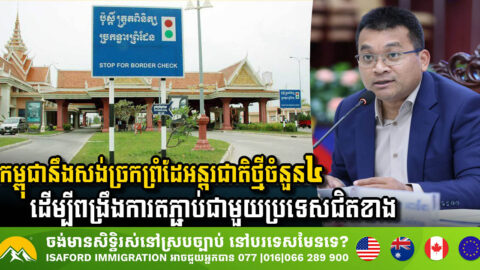Borey Peng Huoth Unveils Morakot Village: A New Era of Modern Living Begins in Phnom Penh
Borey Peng Huoth, a leader in residential development, is thrilled to announce the highly anticipated opening of its latest project, Morakot Village. Set to revolutionize the housing landscape in Phnom Penh, this new endeavor showcases innovative house styles, generously sized land options, and exclusive promotional prices. Strategically situated along the bustling 60-meter road, Morakot Village […]
Cambodia-Thailand Trade Relations Soar to New Heights in 2024
In a significant boost to regional trade relations, the trade volume between Cambodia and Thailand reached an impressive USD 10 billion in 2024. This increase, marking a rise from USD 8 billion in the previous year, underscores the strengthening economic ties between the two neighboring countries. During a pivotal meeting on March 11, 2025, Samdech […]
Cambodia to Construct Four New International Border Crossings to Enhance Connectivity
In a significant move to boost regional connectivity, the Cambodian government plans to establish four new international border crossings in Kratie, Takeo, Tboung Khmum, and Ratanakkiri provinces. This decision was announced during a recent meeting chaired by H.E. Peng Po Nea, Minister of Public Works and Transport, held on March 3, 2025. The meeting focused […]
Chinese Investors Eye Expansion in Cambodia: 19 Companies Explore Opportunities
In a significant development for Cambodia’s investment landscape, a delegation comprising representatives from 19 Chinese companies convened with officials from the Council for the Development of Cambodia (CDC) to discuss potential investment opportunities. The meeting took place on March 11, 2025, and was led by Mr. Liu Yong, President of the Young Investors Association in […]
Cambodia Sees Surge in Investment Projects, Approving 112 Initiatives in Two Months
In a notable boost to its economic landscape, Cambodia has approved 112 new investment projects totaling over USD 1 billion in the two months from January to February 2025, according to the latest report from the Council for the Development of Cambodia (CDC). This wave of investment is projected to create more than 70,000 jobs, […]
Cambodian Government Extends Property Tax Exemptions for New Cities and Agricultural Land
In a significant move to support economic growth and agriculture, the Cambodian government has announced the extension of property tax exemptions and reductions for specific areas across the country. According to Letter No. 6402 from the General Department of Taxation, property tax exemptions will apply to newly established cities and unused agricultural land exceeding 5 […]



 ខ្មែរ
ខ្មែរ







